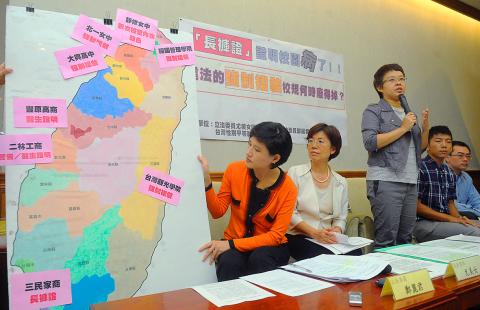Legislators and gender equality groups yesterday urged the Ministry of Education to investigate cases of schools demanding female students provide medical proof of a gender identity disorder if they want to wear trousers instead of skirts to school.
Taiwan Gender Equality Education Association secretary-general Lai Yu-mei (賴友梅) told the legislature that the association received a letter last month from a female student at a municipal vocational high school in Greater Kaohsiung, saying that she was not allowed to wear trousers to school and was asked to apply for “pants permission” if she insisted.
“The school told students who wanted to apply for ‘pants permission’ that they need a ‘signed document from a doctor [or psychiatrist]’ in order to apply,” the student wrote in her letter asking for the association’s help, adding: “I only hope the school won’t look at girls wearing pants with discrimination. It really hurts our self-esteem. We are not sick.”

Photo: Wang Min-wei, Taipei Times
Lai said during visits by the association and other gender equality groups to the reported schools, they found out that principals, teachers and military instructors often respond to the issue of suitable school attire by stating that they are only enforcing the rules to maintain discipline.
“Many educators seem to be unfamiliar with the laws regarding the issue,” Lai said, adding that similar cases have been reported in recent years.
Democratic Progressive Party Legislator Yu Mei-nu (尤美女) said an amendment to the Gender Equality Education Act (性別平等教育法) in June last year stipulated that schools cannot punish students because their hairstyles or clothes do not meet with gender stereotypes.
DPP Legislator Cheng Li-chiun (鄭麗君) said that the Martial Law era is long gone and regulations which prohibit such school rules have been enacted, which means schools must stop discriminating against girls at a formative period in their lives.
“Good discipline does not equate to destroying individuality ... schools are responsible for educating students and should not try to make them all look the same ... uniforms can be diverse, but made with the same fabric,” Yu said.
According to the ministry, if schools violate the regulations and punish students for not conforming to stereotypical gender appearances then funding for private schools can be cut while the performance assessment score of the principals of public schools can be affected, Yu said, asking officials from the ministry to respond to the issue.
Lin Chung-bing (林忠賓), a school inspector at the ministry’s Central Region Office, said that it was true that so far no school had been punished for the enforcement of such discriminatory rules, but the ministry is now planning an all-round investigation of vocational high school rules to gauge the situation.
In addition to the investigation, students can report school violations directly to the ministry through its e-mail service, Student Affairs Committee section chief Eric Ker (柯今尉) said, promising that the ministry would contact all schools, instructing them not to limit the rights of students to decide their school outfits.

Taiwan is stepping up plans to create self-sufficient supply chains for combat drones and increase foreign orders from the US to counter China’s numerical superiority, a defense official said on Saturday. Commenting on condition of anonymity, the official said the nation’s armed forces are in agreement with US Admiral Samuel Paparo’s assessment that Taiwan’s military must be prepared to turn the nation’s waters into a “hellscape” for the Chinese People’s Liberation Army (PLA). Paparo, the commander of the US Indo-Pacific Command, reiterated the concept during a Congressional hearing in Washington on Wednesday. He first coined the term in a security conference last

Prosecutors today declined to say who was questioned regarding alleged forgery on petitions to recall Democratic Progressive Party (DPP) legislators, after Chinese-language media earlier reported that members of the Chinese Nationalist Party (KMT) Youth League were brought in for questioning. The Ministry of Justice Investigation Bureau confirmed that two people had been questioned, but did not disclose any further information about the ongoing investigation. KMT Youth League members Lee Hsiao-liang (李孝亮) and Liu Szu-yin (劉思吟) — who are leading the effort to recall DPP caucus chief executive Rosalia Wu (吳思瑤) and Legislator Wu Pei-yi (吳沛憶) — both posted on Facebook saying: “I

The Ministry of Economic Affairs has fined Taobao NT$1.2 million (US$36,912) for advertisements that exceed its approved business scope, requiring the Chinese e-commerce platform to make corrections in the first half of this year or its license may be revoked. Lawmakers have called for stricter enforcement of Chinese e-commerce platforms and measures to prevent China from laundering its goods through Taiwan in response to US President Donald Trump’s heavy tariffs on China. The Legislative Yuan’s Finance Committee met today to discuss policies to prevent China from dumping goods in Taiwan, inviting government agencies to report. Democratic Progressive Party Legislator Kuo Kuo-wen (郭國文) said

The Ministry of Economic Affairs has fined Taobao NT$1.2 million (US$36,900) for advertisements that exceeded its approved business scope and ordered the Chinese e-commerce platform to make corrections in the first half of this year or its license would be revoked. Lawmakers have called for stricter supervision of Chinese e-commerce platforms and more stringent measures to prevent China from laundering its goods through Taiwan as US President Donald Trump’s administration cracks down on origin laundering. The legislature’s Finance Committee yesterday met to discuss policies to prevent China from dumping goods in Taiwan, inviting government agencies to report on the matter. Democratic Progressive Party